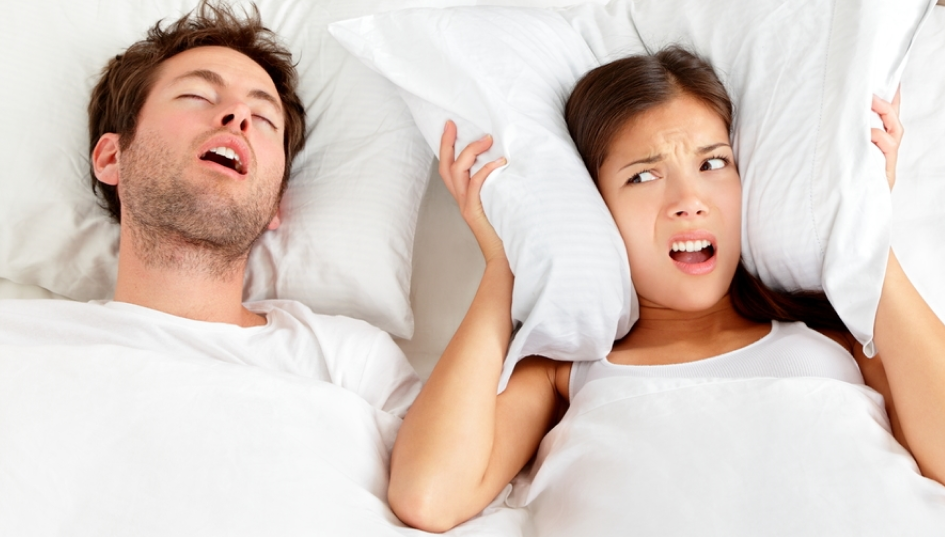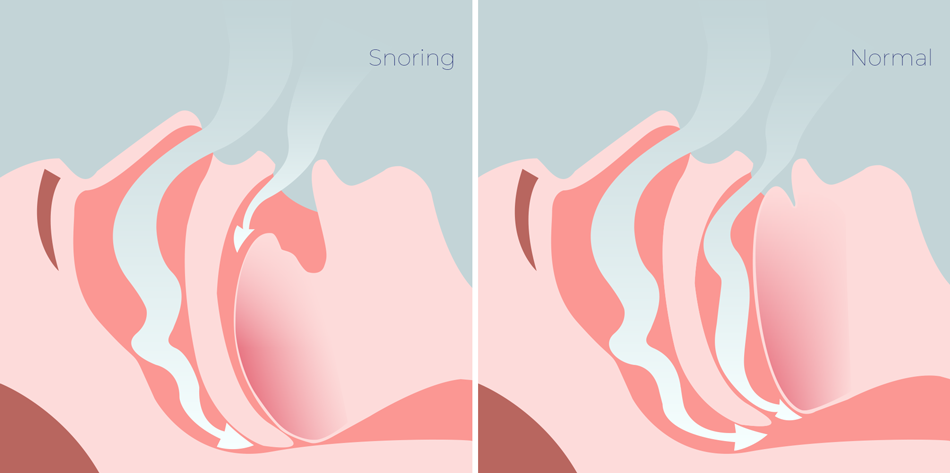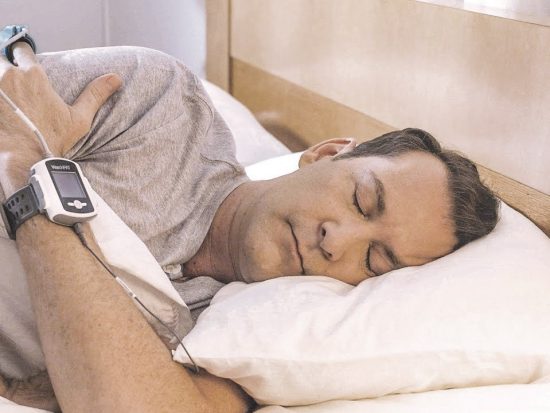
What Causes Snoring
Snoring is caused by a narrowing or blockage of the airway, usually due to a combination of factors such as the anatomy of the mouth and throat, obesity, alcohol consumption, smoking, allergies, or a deviated septum. The noise occurs when the soft palate and tissue in the mouth, nose or throat vibrate. This could project as a rattling noise or snorting sound of which the volume can vary. People who sleep on their backs are likelier to snore than those who sleep on their sides.
Snoring can have a major impact on your life. It can disrupt your sleep, leading to daytime fatigue, irritability, and decreased concentration. It can also lead to a lack of energy and motivation. Loud snoring can also affect your relationships, as it can keep your partner awake at night and cause tension. Additionally, snoring can lead to more serious health issues, such as Obstructive Sleep Apnoea, which can increase the risk of heart attack, stroke, and other serious medical conditions. Although it is often overlooked, it’s important to understand exactly what causes snoring and what you can do to stop it.
Why do people snore?
Snoring does become more likely as we age. If you have suddenly started snoring when you never have before, this new development of snoring can be due to loss of muscle tone which is normal as we age. Some other factors that could affect your risk of chronic snoring include alcohol consumption, sedatives and some types of antidepressants, smoking and allergic rhinitis, where the inside of your nose becomes swollen and inflamed due to an allergic reaction.
Other common reasons why people snore include:
- Being overweight – Excess fat and fatty tissue can cause you to snore. Typically, a person who is obese or has a neck size above 17 inches is more likely to snore. When we carry excess weight, it increases the pressure on the throat when lying down to sleep.
- Sinus and nasal problems – Blocked airways or continuous chronic congestion can make breathing difficult at night.
- Deviated Septum – A deviated septum or nasal polyps make breathing harder during sleep and can cause snoring.
- Allergies – Allergies such as rhinitis (runny nose) or sinusitis will cause the nasal passages to become inflamed, restricting them and causing snoring.
- Pregnancy – The physical and hormonal changes which occur during pregnancy can increase the likelihood of snoring.
- Sleeping position – Sleeping on your back makes you more likely to snore or experience apnoea (breathing pauses).
- Medications – Certain medications are designed to relax our muscles, increasing the risk of snoring.
- Smoking – Smoking causes inflammation in the airway which can restrict the airflow and increase the chance of snoring.
- Alcohol – Alcohol relaxes the muscles and therefore will increase the occurrence of snoring or affect the severity of snoring.
- Genetics – Snoring is not inherited, but certain genetics can contribute to the development of snoring. For example, the anatomy of your mouth, jaw, throat and/or sinuses.
Snoring in the UK
It is essential to recognise that most people snore on occasion. Snoring is a common problem, with approximately 30 million snorers in Britain (1). Although most people only snore occasionally, according to the British Snoring and Sleep Apnoea Association, up to 40 per cent of the UK population experience snoring regularly.
A large proportion of the population has experienced snoring at some point, whether this is due to seasonal blocked sinuses or a more chronic condition. Your snoring may be nothing to worry about; however, in many cases, snoring can also be a sign of underlying health conditions.

Who does snoring affect?
Snoring can be experienced by people of all ages, including children, although it’s most common in adults aged 40-60. It is also believed that roughly twice as many men than women snore. Still, it is essential to remember that it may not only affect the individual but may be a cause for concern to their partner or household member also.
Is snoring healthy?
Many people snore, and its usually harmless. However, loud, chronic snoring can be a sign of an underlying sleep disorder.
What causes snoring in females?
Research has found snoring to be more common in men than women (2). However, menopause, pregnancy, hormonal imbalances and weight gain can all lead to snoring (3). Post-menopausal women have lower levels of oestrogen and progesterone; these individuals are more likely to snore (4). However, all the above causes discussed on this page can also lead to snoring in women.
Will snoring go on its own?
No, snoring usually requires some kind of intervention to resolve, and evidence shows that snoring can get worse over time if left untreated. The vibrations that occur during snoring can damage the blood vessels that supply muscles in the head and neck. This, over time, can cause the muscles to weaken. If your head and neck muscles are weakened, your ability to keep your airways open may get harder, meaning you may snore more frequently and loudly.
Could snoring be a sign of something more serious?
The answer is yes. Unfortunately, snoring can be a sign of a condition called Obstructive Sleep Apnoea (OSA), which can be hard to identify without a recommended Sleep Test. Undiagnosed Sleep Apnoea can carry serious health risks – which we will cover in a moment. Hence, it is always better to test for Sleep Apnoea if you routinely snore.
How do I know if I’m snoring?
If you sleep alone and are unaware if you snore, setting up a recording device to hear if you snore may be helpful. Some signs that you are snoring include:
- Waking up with a dry mouth
- Waking up with a sore throat
- Frequently waking up during the night
- Frequent need to urinate during the night
- Restless sleep
- Morning headaches
How To Stop Snoring – Snoring Solutions
If snoring is affecting your sleep or is having a detrimental effect on how you complete day-to-day tasks, then finding out how to stop snoring could bring many benefits to your quality of life. In fact, there are several things you can do to stop snoring. Snoring is heavily linked to some of the most common lifestyle choices we make on a daily and weekly basis. If you want to find a long-term solution to snoring, we would advise not trying too many things at once. Adapt to one change for weeks or months before trying another, and you are far more likely to make long-lasting changes that you will stick to.
- Maintain a healthy weight – People who are overweight are far more at risk of experiencing and developing snoring and more serious conditions such as Obstructive Sleep Apnoea (OSA). This is because, with an increase in weight, there is an increase in tissue – which will further add to the pressure, and potential obstruction, on a person’s airway. It is also worth mentioning that maintaining a healthy weight will also bring about many other health benefits. You can read more about the link between how much we weigh and Sleep Apnoea here.
- Sleep on your side – Sleeping on your side relieves a lot of pressure from the back of your throat. Although it may not reduce the snoring altogether, it can often make the snoring a lot quieter and easier for a bed partner to deal with.
- Elevate your head during sleep – Raising your head with a pillow when sleeping can help to reduce snoring as it helps to open the upper airway.
- Say NO to alcohol before bed – Drinking alcohol will further cause the muscles and tissue in the back of the neck to relax, increasing the chance of snoring. Alcohol can also prevent a person from reaching the deep level of sleep required to restore and repair. Although alcohol may help you nod off – it will harm the quality of sleep you achieve. Read more about how Alcohol can affect your sleep.
- Stop smoking – Nicotine can cause inflammation in your airways, making breathing harder at night. Nicotine encourages snoring because it obstructs your airflow. Smoking can also worsen the symptoms of Sleep Apnoea.
- Clear your nasal passages – Particularly during winter, or if you are susceptible to colds, flu or hay fever – the congestion in your airways could contribute further to snoring. Several treatments are available to help clear your passages before going to bed to reduce the risk of snoring. One of these treatments is called SinuPulse– a nasal irrigation system which is clinically proven to clear out the nasal passage of mucus, bacteria and particles using a drug-free saline solution.
- Use an anti-snoring mouthpiece – A Mandibular Advancement Device is an anti-snoring mouthpiece that holds your jaw forward to prevent airway obstructions that cause snoring. You can also try a tongue-retaining device that helps to hold your tongue in place, reducing snoring.
- Mouth exercises – Reduced muscle strength around the airway makes you more likely to snore, but there are mouth exercises that can help. Some exercises you could try are tongue slides and tongue stretching.
Is Snoring Dangerous?
There are many different types and severities of snoring. While snoring can often be harmless, it can also indicate an underlying medical condition. Here are some conditions related to snoring:
- Obstructive Sleep Apnoea (OSA)
- Hypothyroidism
- Nasal Polyps
- Deviated septum
- Cardiovascular Disease
- Upper Airway Resistance Syndrome (UARS)
- Enlarged Tonsils and Adenoids
The Link Between Snoring and Sleep Apnoea
Obstructive Sleep Apnoea is when a person’s upper airway becomes obstructed. Your oxygen supply begins to get cut off, and your breathing is paused (an Apnoea event). Your breathing will start to become laboured, and ultimately, you will wake up choking due to a lack of air. These breathing pauses can last up to 10 seconds and occur over 30 times per hour every night. Snoring is closely linked to OSA as it is one of the most common symptoms. Sleep Apnoea snoring can be extremely loud and result in choking or gasping for air.
Untreated Sleep Apnoea can significantly reduce your life expectancy, with findings showing that individuals with moderate Sleep Apnoea have an increased risk of death by 17%. This is roughly doubled in those with severe OSA (5).
If you experience any of the following symptoms, then it is advisable to check if Sleep Apnoea is causing them:
- Gasping or choking during sleep
- Poor concentration
- Memory loss
- Lack of interest in sex
- Loud snoring
- Morning headaches
- Anxiety or depression
- Daytime sleepiness
- High blood pressure
- Frequent urination during the night
- Teeth grinding
Obstructive Sleep Apnoea (OSA) affects 1.5 million people in the UK. Nearly 1 in 4 men and a smaller percentage of women. 85% are undiagnosed.
The Danger of Undiagnosed Sleep Apnoea
While snoring occasionally can be harmless, excessive snoring and Sleep Apnoea are associated with potentially serious long-term health conditions. Some of these include:
- Congestive heart failure
- Liver problems
- Atrial fibrillation (an irregular heartbeat)
- High blood pressure
- Type 2 diabetes
- Higher risk of heart attacks and strokes
While the physical dangers are worrisome, let’s not forget that failing to obtain an adequate amount of sleep can impact your quality of life. You will feel tired throughout the day. Your mind will not remain as “sharp” as it would otherwise be, and your ability to concentrate at work may decrease. Driving can be affected if you’re tired at the wheel, and you could also develop problems with a partner or significant other because of a lack of sleep.
Many studies have likewise shown that a lack of quality sleep increases the chance of anxiety and depression. All these reasons are why it is so important to discover whether or not your snoring is a symptom of this condition. The first step would be to use our Free Online Sleep Apnoea Risk Test.
This simple multiple-choice questionnaire determines your risk of suffering from Obstructive Sleep Apnoea (OSA).
In-Home Sleep Test
Depending on the outcome of the questionnaire, you may decide to obtain a more definitive result. This can be provided by an In-Home Sleep Study. Conducting a Sleep Test at home is a simple and affordable way to determine if you have Sleep Apnoea.
Our sleep test is an alternative option to the NHS sleep clinic. A sleep test with the NHS can take up to two years, but with a sleep test already completed, you can often find the process of getting treatment on the NHS faster, or you can choose to start treatment yourself.
The sleep test measures your snoring intensity, blood oxygen levels, body positioning, body movements and Peripheral Arterial Tone. One of our expert sleep technicians will evaluate your sleep data, and you receive a report within two working days.
Sleep Apnoea Snoring Treatment
Those who have Sleep Apnoea confirmed they will require treatment to manage their snoring and other symptoms. Continuous positive airway pressure (CPAP) therapy is the gold standard treatment method for OSA, and many people experience positive results from it. It consists of a machine, mask and tube that provides a continuous airflow to keep the airway free of obstructions. For the majority of Sleep Apnoea patients, CPAP therapy is the recommended treatment method.
Still not sure if you should take a sleep test? Take a look at our guidance page here to help you.
If you need any help or advice, do not hesitate to contact us.
REFERENCES
- Davey, M., 2018. British Snoring & Sleep Apnoea Association. [online] Britishsnoring.co.uk. Available at: <https://britishsnoring.co.uk/media.php#:~:text=Snoring%20Facts,million%20people%20in%20the%20UK.> [Accessed 19 October 2022].
- Basoglu, O.K. and Tasbakan, M.S. (2017) “Gender differences in clinical and polysomnographic features of obstructive sleep apnea: A clinical study of 2827 patients,” Sleep and Breathing, 22(1), pp. 241–249. Available at: https://doi.org/10.1007/s11325-017-1482-9.
- Chuang, L., Lin, S., Lee, L., Li, H., Chang, C., Kao, K., Li, L., Huang, C., Yang, C. and Chen, N., 2016. The gender difference of snore distribution and increased tendency to snore in women with menopausal syndrome: a general population study. Sleep and Breathing, 21(2), pp.543-547.
- Sigurðardóttir, E.S. et al. (2022) “Female sex hormones and symptoms of obstructive sleep apnea in European women of a population-based cohort,” PLOS ONE, 17(6). Available at: https://doi.org/10.1371/journal.pone.0269569.
- Young, T., Finn, L. and Peppard, P. (2008) “Sleep disordered breathing and mortality: Eighteen-year follow-up of the Wisconsin sleep cohort,” Sleep, 31(8). Available at: https://doi.org/10.5665/sleep/31.8.1071.




